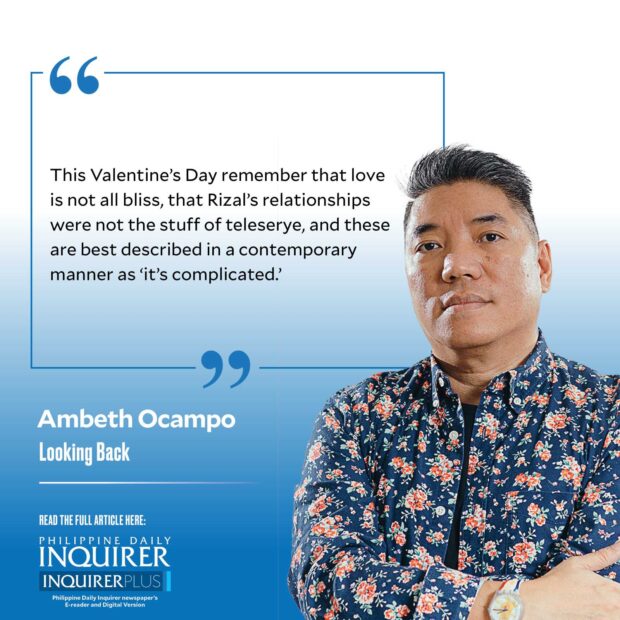Rizal’s relationship status: It’s complicated

Jose Rizal’s love letters should prove that love is complicated, but he didn’t keep copies, not even drafts in his notebooks.
Recipients kept Rizal’s letters from curious “Marites” like me. Leonor Rivera made sure these letters remained private and burned all their correspondence before her marriage to Charles Henry Kipping two days before Rizal’s 29th birthday on June 17, 1890.
What little that survived is in the 25 volumes of Rizal’s collected writings. Rizal’s correspondence was organized under these groupings: “Family Members,” “Colleagues in the Propaganda Movement,” and “Ferdinand Blumentritt.”
Everything else that didn’t fall into those categories was lumped under the slim volume “Miscellaneous Correspondence.” Letters from Rizal’s girlfriends are in this volume: two from Leonor Rivera, two from Suzanne Thill, four from Nellie Boustead, and two from Josephine Bracken.
With only a one-sided view of Rizal’s relationships, we are left to our imagination as to what he was like as a partner. Two letters from Leonor Rivera in 1881 refer to writing:
“If I have not answered your letters,” she wrote Rizal on Jan. 2, 1881, “it was not because I am bored corresponding with you. In fact, twice I wrote replies, but on the day I did so nobody came to visit me at the college, so I destroyed them, and besides I was already embarrassed.”
Leonor received a letter from Rizal under a different signature and said: “Perhaps you have put another name, fearing I might despise it and if I despise it, it will not be your name but somebody else’s. If that is what you think, you are mistaken for you do not know how glad I am when I receive one of your dear letters; but you did well in putting in another name in case, as you say, it may fall into the hands of strangers.”
On Dec. 28, 1881, Leonor signed herself with a codename: “Taimis.” Upset that Rizal has not written to her, she rants: “You are like a newly opened rose, very flushed and fragrant at the beginning, but afterwards it begins to wither … when I did not write you, you wrote me, but now no more … you are at your home and nobody meddles with you. Truly I tell you that I am very resentful for what you have done and for another thing that I will tell you when you come.”
Another person pining for Rizal’s letters was Suzanne Thill, from Brussels, Belgium, previously mistaken for Suzanne Jacoby, who narrated on Oct. 1, 1890, that someone had come to visit bringing news about Rizal. Told that Rizal planned to return to Brussels: “It made me so happy I could not sleep … I hope your courts are open and I shall not have to wait a long time for your decision. Don’t delay too long writing us because I wear out the soles of my shoes running to the mailbox to see if there is a letter from you. Waiting impatiently for your letter in which you will tell me all that I want to know …”
Then, comes an intriguing postscript that reads in part: “There will never be any home in which you are so loved as in that in Brussels, so you little bad boy, hurry up and come back …” Is “little bad boy” merely a term of endearment or should we take it literally? A dozen letters from Suzanne Thill (and perhaps from the older Suzanne Jacoby too) were lost or destroyed in the National Library during the 1945 Battle for Manila. Teodoro M. Kalaw chose not to include them in the six-volume “Epistolario Rizalino.” Having read these lost letters, he alone knows what “little bad boy” means.
Nellie Boustead is different. She didn’t encourage Rizal’s suit. She wrote a rambling letter on April 24, 1891, that reads: “You should remember how little disposed I was to [listen] when [you began] to tell me your [feelings] towards me … I ended in giving way thus … [in] treating you familiarly it is true that I did not go further because I awaited your decision over the matter of my condition.” She was Protestant and required Rizal to convert from Catholicism. She dismisses him but wishes him back: “Now that you are leaving [Europe] I wish you a happy trip and may you triumph on your undertakings … My remembrance will accompany you as also my prayers … Goodbye then! Remember, you must come back; Ah! What if you meet some other woman down there!!”
On May 11, 1891, Nellie advised Rizal to stop asking her parents for her hand in marriage. Her mother “exposed me to the difficulties that might present themselves, that you are not so settled as to permit yourself to maintain a family, etc., etc.” To this, she replied: “His intention is never to marry me before he has what he lacks in order to maintain a home.” In addition, a condition for marriage was that Rizal convert. “I possessed nothing extraordinary and if I am beloved by someone, it is he that is responsible for his madness.”
On Aug. 13, 1896, Josephine Bracken advised Rizal to marry someone else: “If you go to Spain you see anyone of your fancy you better marry, but dear hear me, better to marry than live like [what] we have been doing. I am not ashamed to let people know my life with you but [as] your sisters are ashamed I think you had better get married to someone else.”
This Valentine’s Day remember that love is not all bliss, that Rizal’s relationships were not the stuff of teleserye, and these are best described in a contemporary manner as “it’s complicated.”
—————–
Comments are welcome at aocampo@ateneo.edu




















